Protesters demand justice for Joyce Echaquan
Organizers denounce systemic racism, call for accountability in Quebec healthcare system
The death of Joyce Echaquan is a sign of systemic racism in Quebec, activists say. Thousands descended upon Place Émilie-Gamelin in the chilly afternoon on Saturday, Oct. 3, to call for justice.
An Atikamekw mother of seven, Echaquan died at the Centre hospitalier régional de Lanaudière in Joliette on Sept. 28. She was insulted and demeaned by hospital staff while she lay dying.
The protest’s purpose was for community members to come together to grieve, share, and spread awareness of systemic racism, said Nakuset, the executive director of the Native Women’s Shelter and organiser of the march.
Echaquan, who wore a pacemaker and had a history of heart issues, was admitted into the CHRDL due to stomach pains. On Sept. 28, she complained to hospital staff that they had administered her too much morphine. Even after her complaints, they continued to give it to her.
In a livestream she posted to her Facebook account before her death, she’s seen tied to the bed. She calls out for help while two nurses in the background can be heard yelling insults at her. They call her “stupid as hell,” tell her “she’s only good for sex,” she’s made bad choices in life, and ask her what her children would think of her.
Two of the nurses involved have been fired. Her family is currently seeking criminal charges for all of those involved and will launch a lawsuit against the hospital.
In the hours following the protest, Quebec’s public security minister, Geneviève Guilbault, announced that she has ordered a public inquiry into the circumstances surrounding Echaquan’s death.

The protest began with speeches around 1 p.m. Around 2:30 p.m., the crowd began marching through the streets of the city, chanting “Justice For Joyce” and “No Justice, No Peace.” Some attendees were also equipped with drums, keeping the pace like a heartbeat.
At around 3:00 p.m., the march ended at a green space on De Maisonneuve Blvd.
Most of the attendees came masked, but free masks were also distributed. The organizers consistently reminded attendees to socially distance and to be mindful of the space around them.
At the green space, Nakuset called on the government to strictly implement the recommendations of the 2019 Viens Commission.
The commission was issued by retired Superior Court Justice, Jacques Viens, targeting systemic racism in Quebec. The report, which was a result of nine months of testimonies about the mistreatment and abuse faced by Indigenous people, laid out 142 recommendations addressed to the Quebec government.
“Her seven-month old child will never know her—they’ll only know what happened to her.” —Ellen Gabriel
The recommendations—which include calls to action such as a public apology, modifications to the curriculum, and policy changes—aim to confront the systemic racism that exists in several sectors of Quebec society. These sectors include policing, correctional services, youth protection, and more.
Nakuset, a mother herself, said the incident left her feeling a range of emotions—from anger, to heartbreak, to sadness, and hopelessness.
“I just think about her children,” she said. “Now, if they ever get sick and need to go to the hospital, they’re gonna be afraid—because they’re gonna remember that that’s where they’re mum died. In this way, the hospital staff have created intergenerational trauma.”
At the march, Ellen Gabriel, a long-time Kanien’kehá:ka activist from the Kanehsatà:ke Nation, echoed this concern. “Her seven-month old child will never know her—they’ll only know what happened to her,” she said.
Gabriel added that systemic racism against Indigneous people has been ever-present in the Canadian healthcare system, and that Echaquan’s death is not an isolated incident. Most notably, she mentioned the death of Brian Sinclair.
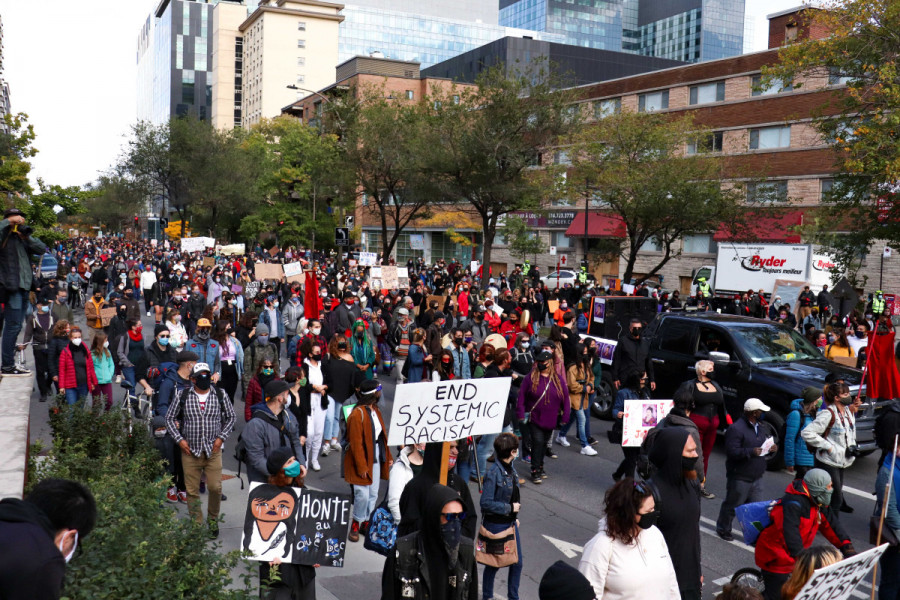
Sinclair, who was an Indigenous man living in Winnipeg, was sent to the Health Sciences Centre to have a catheter changed. He was found dead 34 hours later after waiting in the hospital’s emergency room for more than a day without being seen by the doctor. In an inquest, hospital workers had assumed Sinlcair was drunk and sleeping it off, had been discharged previously and had nowhere to go, or was homeless and came in to avoid the cold.
Gabriel also noted a situation in 1907. Peter Bryce, an official working for what was then known as the Department of Indian Affairs, discovered that 62 per cent of Indigenous children with tuberculosis had died after poor conditions and lack of sanitation at residential schools.
“That was a hundred years ago and it’s still happening. Indigenous people are treated as disposable people,” said Gabriel.
Jessica Quijano, a worker for the Iskewu project—an initiative started by the Native Women’s Shelter—critiqued Prime Minister Justin Trudeau for not implementing any of the 2019 Viens Commission’s recommendations.
She mentioned how the Indigenous women she works with were extremely dismayed this week after the news of Echaquan’s death.
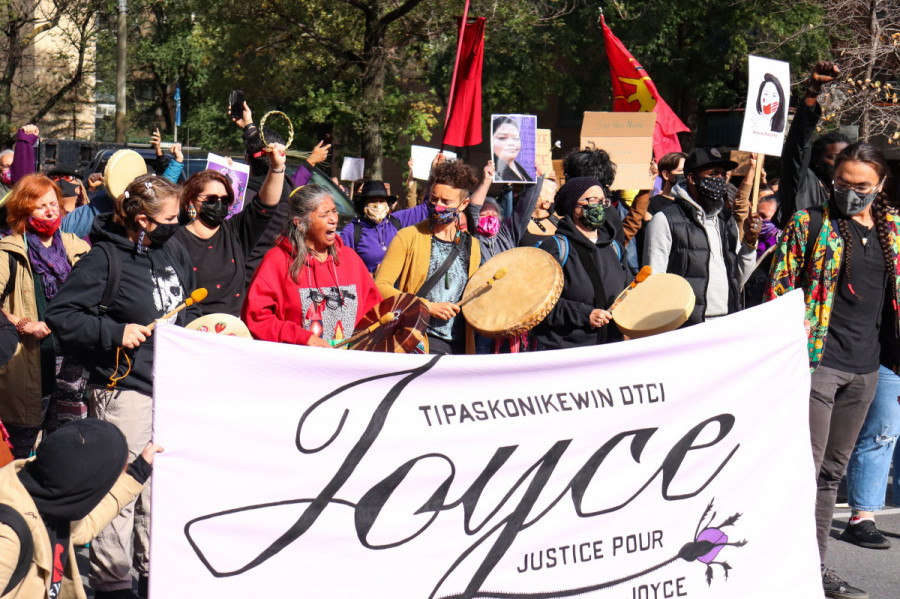
“They tell me, ‘Jessica, this is why I don’t go to the doctor. This is why I don’t get a rape test kit after I’ve been sexually assaulted—because I dont know what they’ll do to me,’” she said.
Nakuset stressed that systemic racism doesn’t only affect Indigenous people in the healthcare system, but in every sector of society. She’s been working in collaboration with Batshaw Youth and Family Centres, and has been trying to get them to implement Viens Commission recommendations that deal with youth protection.
“They said no,” she said. “And to this day, they haven’t implemented a single one of them.”
She also noted the systemic discrimination within law enforcement.
“Indigenous people are 11 times more likely to be stopped by the police. And what have they done to correct that? Nothing!” she added.
She suggests that the Gladue reports aren’t being regularly applied by judges in the justice system—a right Indigenous people have under the Canadian criminal code. It’s a principle that recognizes the systemic racism Indigenous people face in and out of the justice system. It instructs judges when sentencing or setting bail to consider all available sanctions besides imprisonment, when reasonable, with particular attention to the circumstances faced by Indigenous offenders.
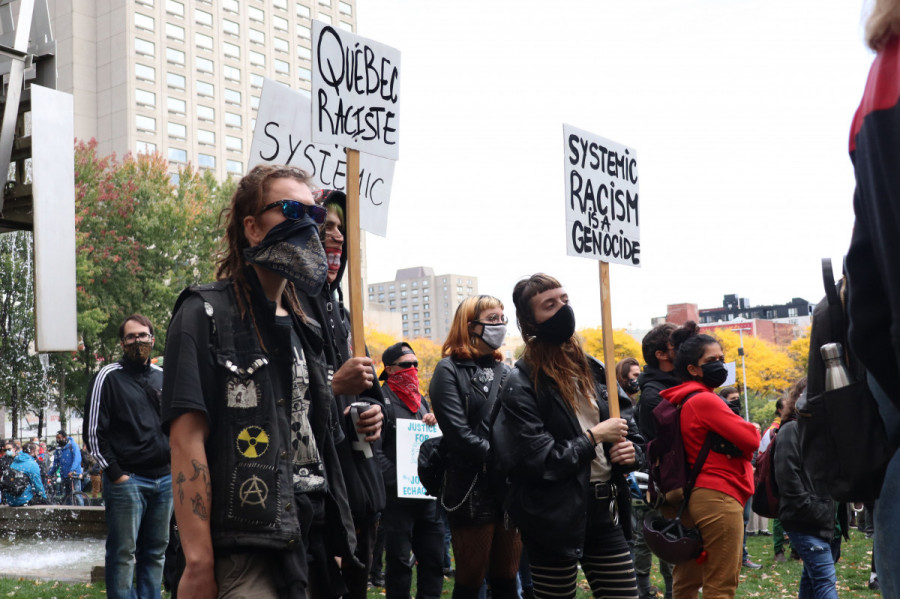
Premier François Legault said he was shocked by the racism he witnessed in Echaquan’s video, but insists that systemic racism doesn’t exist in the province.
“Premier Legault, you are promoting racism, you are supporting systemic racism that has kept Indigenous people down and decreased their population,” Gabriel said in response. “It is because of people like you—who deny that these acts even occur.”
Nakuset supports Echaquan’s family in pressing criminal charges against the nurse. She hopes the nurses—who are currently unknown—have their identities revealed, their licenses revoked, and for there to be a full investigation of the entire hospital. She called for more stringent measures to ensure a lack of racial bias in the institution.
“People should be tested to see if they have any anti-Indigenous bias, and if they do, they must be removed and replaced with someone who doesn’t. That’s the only way,” she said.
Gabriel added that it’s only a part of a larger ongoing assault against the “self-determination” of Indigenous People in Canada.
“Self-determination doesn’t just mean a collective right—it also means an individual right. Joyce’s right to self-determination was taken away by people who were educated into believing that Indigenous people are less than them,” she said.



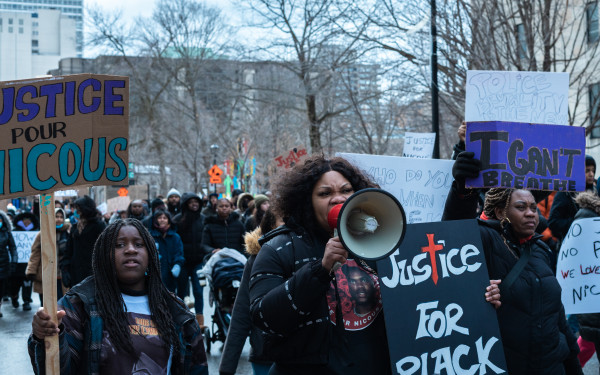
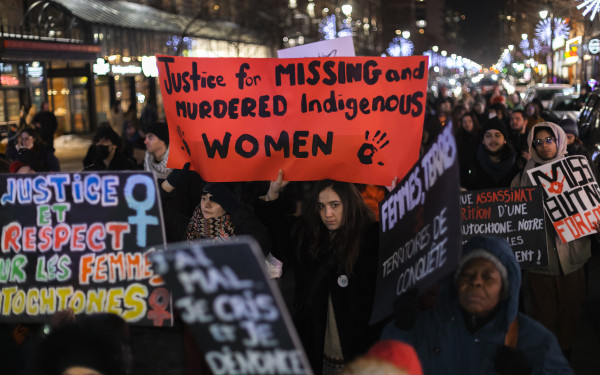
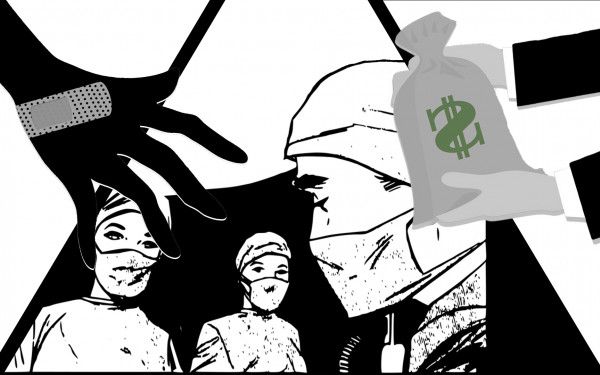
_(1)_600_375_s_c1.png)